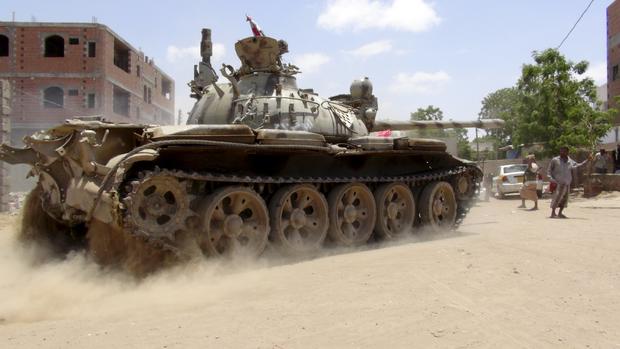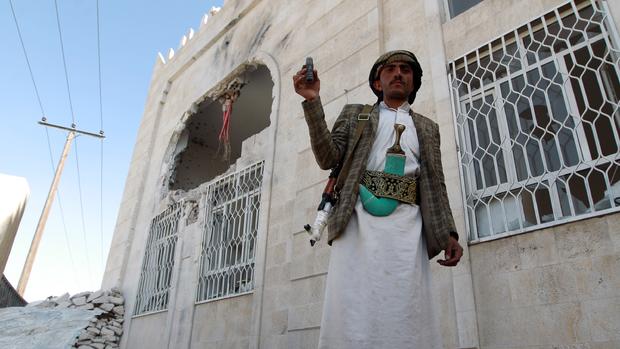Saudi-led coalition resumes Yemen strikes
SANAA, Yemen - The Saudi-led coalition resumed airstrikes targeting Shiite rebels in Yemen on Monday in the southern port city of Aden with U.S. support, after a five-day truce came to a close following talks on the war-torn country's future that were boycotted by the rebels.
Coalition airstrikes hit rebel positions and tanks in several neighborhoods of Aden after the cease-fire expired at 11 p.m. on Sunday, Yemeni security officials said, speaking on condition of anonymity because they were not authorized to speak to the media. Later in the day there was cross-border fire along the two countries' shared frontier in northern Yemen.
Speaking Monday in Seoul, South Korea, Secretary of State John Kerry defended the Saudis and said they were reacting to rebel violations of the ceasefire agreement.
"The Houthis were engaged in moving some missile-launching capacity to the border and under the rules of engagement, it was always understood that if there were proactive moves by one side or another, then that would be in violation of the ceasefire agreement," said Kerry, according to the Reuters news agency.
"Saudi Arabia, under the rules of engagement, took action to take out those missile launchers," said Kerry. "We continue to support the idea of extending the humanitarian pause, but I think under the circumstances at the moment that would be difficult."
The cease-fire hadn't halted all fighting in Yemen between the Shiite rebels, known as Houthis, and government forces loyal to exiled President Abed Rabbo Mansour Hadi.
Earlier Sunday, hundreds of Yemeni politicians and tribal leaders gathered in Saudi Arabia for three days of talks on Yemen's future, but the Houthis refused to participate.
The Shiite rebels reject the main aim of the talks -- the restoration of Hadi, who fled the country in March in the face of rebel advances -- and the location of the negotiations in Saudi Arabia, which is leading an air campaign against the Houthis and their allies.
The Houthis' backers in Iran also made it clear they were uninterested in any talks based in the Kingdom, with a senior aid to Supreme Leader Ayatollah Ali Khamenei reportedly saying it could not be considered an "impartial party" in the crisis.
The absence of the Houthis means the national dialogue is unlikely to end the violence.
The U.N. envoy to Yemen, Ismail Ould Cheikh Ahmed, opened the meeting in Riyadh by calling on all parties to ensure that the shaky cease-fire leads to a lasting truce.
"I call on all parties to refrain from any action that disturbs the peace of airports, main areas and the infrastructure of transport," said Ahmed, speaking on behalf of U.N. Secretary-General Ban Ki-moon.
Since late March, Saudi Arabia has led airstrikes against the Houthis and allied military units loyal to former President Ali Abdullah Saleh. The campaign is aimed at weakening the Houthis and restoring Hadi, who addressed the talks Sunday.
"This conference taking place today is in support of politics and community, and rejects the coup," Hadi told the gathering.
He urged a return to the political road map through which Saleh stepped down after more than three decades in power following a 2011 Arab Spring-inspired uprising. Saleh's ouster and the road map was backed and overseen by the six-nation Gulf Cooperation Council, which is headquartered in Saudi Arabia, as well as the U.N. and the U.S.
Among those taking part in the conference are members of Saleh's former ruling party.
Yemen's conflict has killed more than 1,400 people - many of them civilians - since March 19, according to the U.N. The country of some 25 million people has endured shortages of food, water, medicine and electricity as a result of a Saudi-led blockade. Humanitarian organizations had been scrambling to distribute aid before the end of the truce.
That includes an Iranian cargo ship carrying humanitarian aid en route to Yemen. Iranian state television quoted Nasser Charkhsaz, the head of the Iranian Red Crescent's Relief and Rescue Organization, as saying that the ship is currently sailing in international waters near Oman's Salalah port and will arrive at the Bab el-Mandeb strait between Yemen and Djibouti and Eritrea in two days.
According to the report, the ship is scheduled to reach Yemen's port city of Hodeida by Thursday if plans go smoothly.
Western countries accuse Shiite power Iran of backing the Houthi rebels, something the Islamic Republic and the rebels deny.
Meanwhile, a suspected U.S. drone strike hit a car carrying a group of people believed to be al Qaeda fighters, Yemeni security officials said. The strike was in Shabwa province, where the extremist group has sent reinforcements. The officials spoke on condition of anonymity because they were not authorized to speak to reporters.

